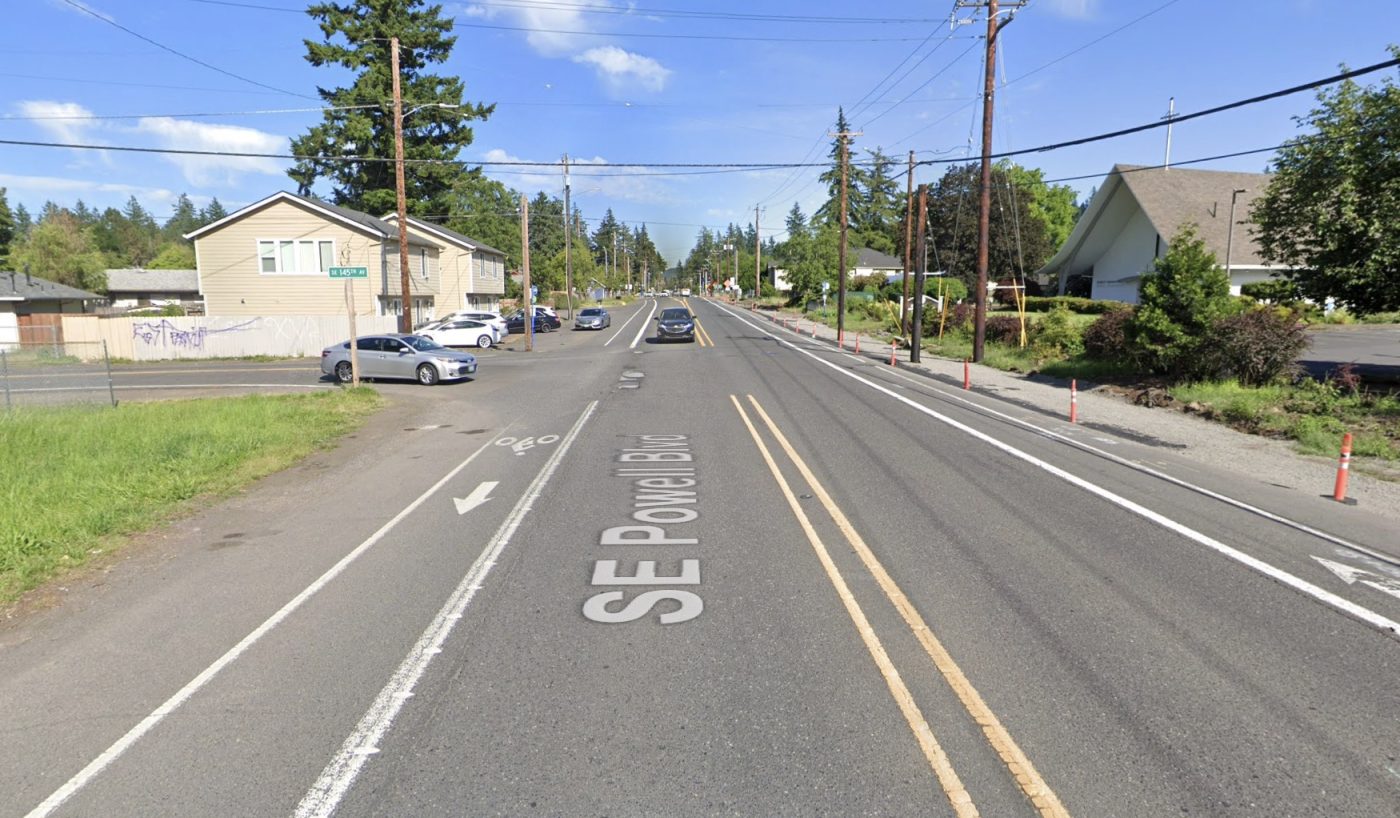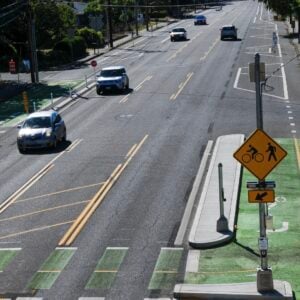
A man has been arrested and charged with drunk driving and assault for his role in the death of a bicycle rider.
In a statement released a few minutes ago, Portland Police say they responded to a collision at SE 145th and Powell Boulevard on Sunday (7/13) around 7:00 pm. When they arrived, 85-year-old Portland resident Raymond Myers was seriously injured, but was expected to survive.
The driver, 54-year-old Hiep P. Tran of Portland, was visibly intoxicated at the scene and was ultimately arrested. He has been charged with Assault in the Third Degree and Driving Under the Influence of Intoxicants. On Monday morning, PPB were notified that the victim had died. That triggered an additional Negligent Homicide charge for the driver.
This section of Powell Blvd (Higway 26) is just a few blocks from Powell Butte Nature Park. It has one standard travel lane in each direction and painted, unprotected bike lanes. The speed limit is 30 mph.

The Oregon Department of Transportation is currently working on a project that will bring much safer bike lane designs to this stretch of Powell. Phase 2 of their Outer Powell Safety Project began last month and will include a host of safety upgrades — including a raised, separated bike lane. The goal of the project is to bring Powell up to good condition in advance of a jurisdictional transfer to the City of Portland as prescribed by legislation passed in 2017.
It’s unclear what led up to Sunday’s fatal collision and whether or not planned safety upgrades would have impacted behaviors of Tran or Myers.
According to the BikePortland Fatality Tracker, this is the 16th fatal traffic crash in Portland so far this year. That’s less than half the total on this same date last year.
Police are still investigating this collision. If you saw it or have any information, contact crimetips@police.portlandoregon.gov attn: Traffic Investigations Unit and reference case number 25-186800.







Thanks for reading.
BikePortland has served this community with independent community journalism since 2005. We rely on subscriptions from readers like you to survive. Your financial support is vital in keeping this valuable resource alive and well.
Please subscribe today to strengthen and expand our work.
We live in a society that enables CARnage.
Three major car related bicycle crashes in the Portland area in a week. All very different in nature, all shocking and horrific.
Cars are deadly, and normally good and well meaning people behind the wheel become dangerous for a variety of different reasons. We need to do more to make our streets safer.
“normally good and well meaning people” don’t drive while intoxicated and forcefully intervene when others in their presence intend to drive while impaired.
Super bummer.
The graphic you showed above shows a grade-separated bike lane on one side only. Is that the current plan, and if so, any idea why?
Either way, it’s going to be a heck of an improvement over what’s there today.
There’s a major aqueduct under the sidewalk on the north side of Powell, but I don’t know how it affects the design. There are also significant slope issues, driveways, drainage issues, etc.
There have been so many deaths along Powell they ought to put up a series of permanent memorials to all the victims.
This case is sad enough, but even sadder is the fact that if the driver had hit and killed the cyclist *without* being drunk, police would have declared it “an unfortunate accident” and the driver would not have been charged with anything other than failing to stay in his lane, which is traffic ticket, as long as he “stayed at the scene and cooperated with police.” The only time it’s NOT okay to kill a cyclist with your car is when you are drunk.
Even then, they don’t get punished for killing someone; only for drunk driving. At that, really only for getting caught driving drunk.
Are you sure?
I’ve heard people say this before, and while I understand it on a visceral level, I think it is fair to say that successfully prosecuting someone for killing a cyclist when there is not clear evidence of criminal wrongdoing (like driver being drunk) is very difficult.
How can we know when criminal driving behavior led to a crash? How do we prove it?
I don’t know, but I strongly suspect that most crashes are not the result of criminal behavior, and that the evidence is pretty thin when it is. I want criminal drivers to be prosecuted, but I also don’t want people arrested on flimsy charges or without clear evidence. Those two desires may be in tension with one another, and I don’t know how to resolve it.
It may be, as Beth said in response to a different story, that we live in an imperfect world.
That all seems accurate, but in the end it’s basically saying the same thing as Fred.
I do think convictions could be increased if cops, investigators, prosecutors, etc. wanted to make that happen. It would start with not viewing events exclusively through the eyes of drivers. I think clear evidence often exists, but is overlooked or downplayed.
I think you have to start by looking at what the law says. Maybe the police do overlook evidence of criminality in crashes, but I’ve looked at the laws (as I imagine you have), and even in cases where it seems like they should apply, I’m really not sure how you would convince a jury beyond a reasonable doubt that a typical crash reached the level of criminality. At the lowest level (reckless driving), that is defined as “consciously disregarding a substantial and unjustifiable risk that is a gross deviation from the standard of care of a reasonable person.” (paraphrase) What sort of behavior meets this standard? Swerving off the road and onto the shoulder does not, in itself, seem to meet this standard (unless you can prove it was intentional, though it does beg the question about whether swerving off the road should, in itself, be a criminal act, a topic for another time).
Where what I’m trying to say differs from what I think Fred is saying is that I think we’re better off understanding and talking honestly about the difficulties involved in proving crimes were committed rather than writing everything and everybody off as corrupt.
I mean, do you actually believe that anyone thinks it’s ok to kill a cyclist? That may be an expression of frustration, but I don’t think it’s helpful. Making every conversation about how the cops don’t care about dead people doesn’t lead to a solution. Making every conversation about how the law could be changed to make it more enforceable might get us somewhere.
Really great post 2wheels.
So one low hanging fruit that gets overlooked vis a vis determining liability in crashes is the speed of a person driving a car. Determining exact speed can be tricky, but it’s often very clear that the driver was over the limit. There’s a lot of forensic evidence from skid marks, vehicle damage, and debris patterns, witness statements, but that evidence pales in comparison to traffic cameras. But liability still is not necessarily determined by speeding per se. That I think needs to change. If you are operating a car x mph over the speed limit, you should be held liable x% at a minimum.
Speeding itself should be defined as a gross deviation from the standard. Running with an axe in a populated place and injuring someone would fall under the above risk, but using a car doesn’t. This isn’t because the risk is substantially different, but because of cultural norms around the ubiquitous unsafe use of SOVs. Unfortunately, the law reflects who is in power, and getting the language of laws to reflect this is an uphill battle.
People don’t generally run around with axes, but a great many people drive, and there is a general consensus that some degree of speeding is ok. Whether this should or should not be true is beside the point: it is true. If you want to define speeding as an “unjustifiable risk” and a “gross deviation from the standard”, you first need to form a new consensus that speeding so unjustifiable and unacceptable that people actually see it as grossly deviant. The law might need to change (which requires “those in power” — who we select — to be on board), and juries (i.e. the general population) need to be willing to uphold that standard. If that happens, police and prosecutors will come along.
We’ve changed views before, with drunk driving and seatbelts and smoking and it might be starting with drinking itself. I believe such a consensus exists with extreme speeding, but we’re not there yet with low and moderate speeding.
We can make progress, but it requires persuasion and changing societal views, not making outlandish claims that the police and prosecutors do not care about people dying a violent and premature death.
Let’s reframe these conversations so that they have at least some hope of being productive.
Where are you seeing anyone doing that? It seems like you are making an outlandish claim.
I don’t think that’s an outlandish characterization of what Fred wrote above in the post that finishes “The only time it’s NOT okay to kill a cyclist with your car is when you are drunk.”
It is also a sentiment that I have read on this forum many times. People are understandably frustrated at the lack of consequences in a fatal crash, and tend to blame the police not caring rather than the inherent difficulty in building a case. I’m sure you’ve seen this yourself.
I’m a little confused by the assumptions you’re making. I haven’t mentioned anything about the police or prosecutors. I generally hold the view that generalizing about a group isn’t very productive, and should be avoided.
So in quite a few other countries (and increasingly in DC and NYC now), traffic cameras largely serve this purpose. Regardless of the views on speeding, the de facto consequence of frequent and immediate financial penalties makes for rapid and effective behavioral change.
“I haven’t mentioned anything about the police or prosecutors.”
I was referring to the nihilistic comment posted by Fred about it being okay to kill cyclists. I share your views on generalization.
I’m open to the idea that cameras might reduce the number of crashes involving a cyclist, but my comments were focused on how we talk about these issues, and why the common framing here is not only unhelpful, but probably counterproductive. Unless our goal is not to reduce the number of cyclists getting hurt but rather to bash the police.
It might not come across as that common if you read the comments more objectively.
We appear also to be far along the path of agreeing that motorists are not required to stop at stop signs.
In the moment, YES. And, in terms of fairly common ragey behavior, many drivers behave as if they do which is the only meaningful moral distinction.
That’s not who we were talking about.
I’m happy to have a separate conversation about how what we do when impassioned reveals our true moral character, but it’s not relevant here.
It may be a topic for another time for you, but not for me, and probably not for Fred.
I don’t want to speak for Fred, but your example of someone swerving off the road onto the shoulder seems like it perfectly illustrates why Fred said what he said.
Yes, people DO swerve off the road and onto the shoulder–or similarly dangerous behaviors–and hit and injure or kill people if they happen to be in the vehicle’s path. And they get charged with nothing–or almost nothing, unless they’re drunk, as Fred said, or unless it can be proved it was intentional, as you said.
The reason for that may be because of the way the law is written, or because it’s hard to convince a jury to charge the person, as you said. Or, as I said sometimes happens, it may be because authorities make errors because they only see crashes from the standpoint of a driver, or they don’t know the laws, or don’t investigate well, etc.
But the result is the same–low likelihood of charges, especially serious ones.
For the swerving to be considered reckless, the law requires it be intentional. It is the intentional aspect that is difficult to prove (and, I suspect, is absent in most cases). Without intentionality, no criminal act occurred, and, under our current law, no criminal charges can be brought. (The topic for another time was the moral question of whether unintentional swerving should be regarded as a criminal act.)
This has nothing to do with the police caring or not caring. It has to do with the challenges of showing what was happening inside somebody’s head. Drunk drivers do not pose this challenge, and so it is much easier to prosecute them.
You keep bring up the law as if that’s a separate issue, or “a topic for another time”. The fact that the law makes it difficult to prosecute people for things like swerving into a cyclist and killing them is EXACTLY why Fred’s comment makes sense to me.
I’m not trying to make police into uncaring, immoral people. Fred may or may not believe that they are, but I don’t see any evidence from his comment that he does.
You seem to be trying to prove that Fred and/or I are wrong for saying something that neither of us has said.
Fred didn’t say write anything that even remotely indicates he is “writing everything and everybody off as corrupt”.
Not literally corrupt, no. But morally corrupt enough to regard killing a cyclist as OK.
I disagree. Here’s Fred’s comment:
I take that to be a description of the reality that the legal system often does not seriously punish drivers for killing people unless the driver is drunk. I don’t see that he’s saying that police officers or any other person in particular is saying that.
In fact, he DID say what he thought the police would say–he said “police would have declared it “an unfortunate accident” “. That matches what I’ve seen often in articles about road deaths. It’s not inflammatory at all compared to your trying to assert that Fred is saying that police are morally corrupt because they think it’s OK for drivers to kill people if the drivers are not drunk.
This is so tragic. And also tragic is this hysterical belief in Portland that green paint, bollards, and concrete is somehow going to stop it.
Maybe if there had been concrete barriers between the driver and the bicyclist this wouldn’t have happened.
I do agree that paint and plastic wands are useless.